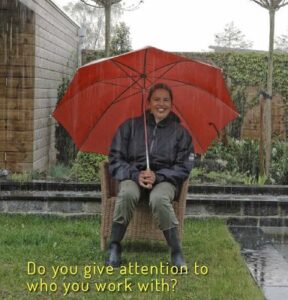 In this reflective time of year, I’d like to ask you how you focus your attention. Do you give genuine attention to the people you meet both in your personal and your professional sphere?
In this reflective time of year, I’d like to ask you how you focus your attention. Do you give genuine attention to the people you meet both in your personal and your professional sphere?
Let’s distinguish three levels of reality: the what, the how and the who. Our education and career are based on the what: our knowledge and expertise. But much more important to success and satisfaction is how you apply your expertise. And that depends on who you are – and whether you did your homework or not.
Homework is: working toward “knowing thyself” and overcoming fear, anger, grief so you don’t desperately need your armor (your ego) and you are able to tap into your true potential.
Know Thyself
Knowing thyself is easier said than done – but who you are, makes the difference. Your unique core, your higher self, your purpose, how you apply your expertise, it all derives from who you are. Adam Grant’s research and book “Give and Take – Why helping others drives our success” underlines this. The difference to your success (apart from your talent, hard work, and luck) stems from who you are and how you relate with others.
There are two extremes in relationships according to Grant:
 Takers like to get more than they give; they are self-focused and see the world as a competitive, dog-eat-dog place. “If I win, you lose.” They want to get the largest piece of the pie.
Takers like to get more than they give; they are self-focused and see the world as a competitive, dog-eat-dog place. “If I win, you lose.” They want to get the largest piece of the pie.
Givers give more than they get with no strings attached – they are other-focused and trust people up front. They believe that there is abundance: “If I win, you win, too!” By supporting everyone, they enlarge the whole pie that can be divided.
Somewhere in between, there are matchers. They value fairness and reciprocity. They have a norm of quid pro quo. If they give, they’ll expect some favor in return, sooner or later. By the way, if you want to read more about Giving, Taking and Matching, read my blog post about Adam Grant’s book.
Givers and Takers
Who are you? In addition to character, could your preference for giving, taking or matching be an acquired style and depend on how much homework you did…? If that makes any sense, the takers are (still) entrenched in fear, anger, and grief and operate from fight and flight responses, using divide & conquer strategies and whatnot. They need to secure themselves by getting more stuff, more power, and acknowledgement.
If that makes any sense, the takers are (still) entrenched in fear, anger, and grief and operate from fight and flight responses, using divide & conquer strategies and whatnot. They need to secure themselves by getting more stuff, more power, and acknowledgement.
The matchers have proceeded further with their homework and feel safer in their world – they may not need immediate gratification anymore – knowing how to be generous at times – guarding fairness in relationships, knowing it’s give-and-take.
The givers then, must be the gurus who have solved most of their old fears, anger and grief: operating from trust, faith and feeling safe.
Who are the givers and takers in your workplace? How do these labels change the way you look at others? How do you perceive or judge the takers in your workplace? How do you entice the matchers to give more? How do you yourself practice to give more…?
The labels help me understand why I don’t like it when people don’t reply to email. Or when they only reply when they need something from me. Some people treat others as objects. As means to an end: they take, focused on the What. Yes, I know they are busy (so am I). Yes, I know I don’t have to take it personally. But I still prefer a more personal style – and relate to the Who.
Professional versus Personal
In the workplace, people are often reduced to their position and job roles. That’s what we call “professional” as opposed to “personal”. It’s very practical and saves a lot of time and hassle. We focus on the What needs to be done – the How and Who is too fuzzy and take more time. But the How and Who determine whether we trust each other and whether we’ll be effective… It’s short sighted to focus on results only – yet that’s what workplace relationships are built on. A transaction of “Whats”: taking or matching your expertise or your results for a fee.
The personal is important at home where we are loved for Who we are – the emphasis is on being.
The professional space values the What – you are respected for your expertise and output: the emphasis is on doing and delivering.
An example: When I’m having dinner in a restaurant, the waiter knows his work and what’s being served, but how he serves me depends on who he is. Even though all waiters serve dinner, I prefer one to the other. The professional relationship with the waiter is that he serves my food. I don’t relate to him personally – asking him if he is married or what matters to him in life. That would violate the professional code and might make him suspicious. “What do you want from me?”
Yet, there’s something I can easily give without making others uncomfortable and slowing down their busy schedule. Let’s bring more personal appreciation into the workspace, more of Who we are: We can give more genuine attention.
I mean attention for the whole person who’s serving my dinner table, instead of treating them as an object or a role. It has nothing to do with the tip I leave at the end of the dinner. It happens during dinner, when I acknowledge them with eye contact, or compliment them, or have a small chat and smile.
Give attention
 When you are present, in the here and now, you pay attention to what happens in front of you. If you are not distracted by your thoughts or your dinner partner you can give attention – the waiter will feel it, see it in your eyes, and you’ll make genuine contact. In that space, you can give a compliment that is not just a polite pleasantry. In that space, you can ask a question that receives an authentic answer instead of a scripted one (“How are you? I’m fine.”). It is about seeing people for who they are.
When you are present, in the here and now, you pay attention to what happens in front of you. If you are not distracted by your thoughts or your dinner partner you can give attention – the waiter will feel it, see it in your eyes, and you’ll make genuine contact. In that space, you can give a compliment that is not just a polite pleasantry. In that space, you can ask a question that receives an authentic answer instead of a scripted one (“How are you? I’m fine.”). It is about seeing people for who they are.
I’ve seen this happen every time that I was present and consciously made contact and acknowledged another human being instead of a job role. The energy shifted. The space became larger, allowing more information and energy to be exchanged. It only happens when two or more people connect to Who they are. They create a field of attention.
I think this is the quality of Grand Role Models like Nelson Mandela, the Dalai Lama, Mother Teresa, Amma and more. They are fully present and personal – connecting with their whole self to Who you are. One person who acknowledges another person. Like the Sanskrit greeting “Namaste”: I bow to you. I acknowledge you.
If this description is too vague for you, try to experience it – connect with a coworker, a waiter, whomever in a professional role, but do this with genuine attention and interest for who they are. Open yourself, attune to them and you might have a very refreshing encounter! Spreading kindness on the go.
Let’s go beyond the short-term, transactional, professional, taking/matching relationships. Let’s be personal and generous givers while we build trust.
I wish you restful Christmas holidays with time for reflection and new inspiration.
Marcella Bremer is an author and culture & change consultant. She co-founded this blog and ocai-online.com.
